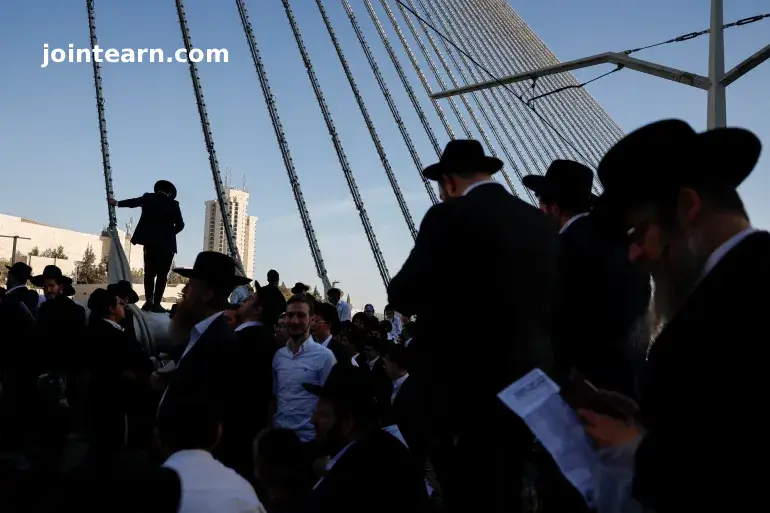
JERUSALEM, ISRAEL — Massive crowds of ultra-Orthodox Jews flooded the streets of West Jerusalem on Thursday, protesting against government efforts to end long-standing military service exemptions. Local media estimated that nearly 200,000 demonstrators took part in the “Million Man Protest,” paralyzing much of the city and reigniting a deeply divisive national debate over faith, duty, and the military.
Massive “Million Man Protest” Paralyzes Jerusalem
Clad in traditional black coats and wide-brimmed hats, tens of thousands of Haredi men marched through the capital carrying placards reading “The people are with the Torah” and “Closing the yeshiva — a death sentence for Judaism.”
Protesters blocked major intersections, burned pieces of tarpaulin, and chanted religious slogans as they called on the Israeli government to preserve Torah study exemptions for ultra-Orthodox Jews.
According to police, at least 2,000 officers were deployed to contain the crowds. The rally remained mostly peaceful, though officials confirmed that a teenager died after falling from a nearby construction site.
“Right now, people who refuse to go to the army are taken to military prison,” said Shmuel Orbach, one of the demonstrators. “But we are a Jewish country. You cannot fight against Judaism in a Jewish country — it does not work.”
A Long-Running Conflict Over Faith and National Service
The protest marks the latest flashpoint in Israel’s decades-long conflict over military service exemptions for the ultra-Orthodox community, also known as Haredim.
When the State of Israel was founded in 1948, exemptions were granted to a few hundred religious scholars devoted to full-time Torah study. Over the decades, however, the Haredi population has surged, and today it comprises nearly 14 percent of Israel’s Jewish population, or around 1.3 million people.
An estimated 66,000 ultra-Orthodox men of conscription age are currently exempt from service — a policy that has become increasingly controversial amid Israel’s ongoing wars in Gaza, Lebanon, and Iran.
Frustration over the exemptions has grown as the Israeli Defense Forces (IDF) struggle to sustain troop levels and as military casualties mount to their highest levels in decades.
Supreme Court Orders Draft for Ultra-Orthodox Men
In a landmark ruling last year, the Israeli Supreme Court ordered that ultra-Orthodox men must be drafted into the military, arguing that in the absence of a new exemption law, Israel’s universal conscription policy must apply equally to all citizens.
The decision sent shockwaves through Israeli politics, destabilizing Prime Minister Benjamin Netanyahu’s fragile coalition government.
In July, the United Torah Judaism (UTJ) party — a key Haredi ally in Netanyahu’s coalition — withdrew from the government, leaving the prime minister with a slim parliamentary majority.
Since then, lawmakers have struggled to agree on a new conscription bill that balances religious rights with the military’s manpower needs.
“The court’s ruling forces the government to choose between political survival and equality in national service,” said political analyst Yael Cohen. “It’s a crisis of identity as much as policy.”
Growing Political and Social Divide
The rift over military service has underscored the deep cultural divide between Israel’s secular and ultra-Orthodox populations.
Many Israelis argue that the exemptions are unfair and unsustainable, while Haredi leaders maintain that Torah study protects the nation spiritually just as soldiers do physically.
With elections scheduled for late October 2026, the issue is poised to become a central campaign battleground. At least 11 new political parties have already registered, signaling a turbulent political year ahead.
Religious Conviction vs. National Obligation
At Thursday’s protest, the atmosphere was defiant yet deeply spiritual. Demonstrators recited prayers, sang hymns, and called on God to “protect the Torah world.”
Aerial footage showed thousands gathered at the Chords Bridge, a symbolic gateway into Jerusalem, waving banners and chanting against what they see as an existential threat to their way of life.
“Our strength is not in tanks but in Torah,” said one rabbi addressing the crowd. “To close a yeshiva is to close the heart of the Jewish people.”
The Road Ahead
As Israel continues its military campaigns across multiple fronts, the government faces mounting pressure to find a solution that preserves national unity while ensuring fairness in conscription.
For Netanyahu, the standoff presents a dangerous balancing act: alienate his Haredi base, or risk further weakening the IDF’s manpower amid ongoing conflicts.
For now, the streets of Jerusalem remain quiet after one of the largest religious protests in recent Israeli history, but the question of who must serve — and who is exempt — continues to divide the nation.


Leave a Reply